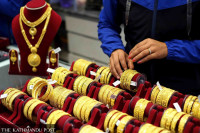Money
Expired packaged food, relabelled to be sold in shops, is exposing consumers to serious health risks
Chocolates and biscuits produced by multinational companies were ready to be shipped to the market when officials seized them last week but such unscrupulous practices happen too often, say activists.
Krishana Prasain
Tonnes of expired foods and other items that were relabelled with a new date and ready to be sent to the market which police seized last week from a warehouse in Kathmandu has shed new light on how human health is put at risk for profit.
The police and the Department of Commerce, Supplies and Consumer Protection on Thursday raided the warehouses of Ayan Distributors, which the department said were the authorised distributors of Unilever products in Nepal and also of United Distributors, which is a subsidiary of well-known business house Vishal Group.
Food brands like Snickers, Cadbury, Pringles, Tang, Oreo, BournVita and different products from Unilever like Horlicks, Dove shampoo, bathing soaps, sanitizer among others were relabelled with new dates.
The estimated value of the goods is Rs40 million, according to the department.
“These products are normally sold on offer,” said Dr Aruna Uprety, a senior nutritionist. “Consumers are enticed with schemes like ‘Buy One get One Free’ to clear the stock of goods and such forceful sales are potentially not good and consumers should be aware of the products while buying.”
Eating expired foods or foods that are past their best-by date can expose the human body to harmful bacteria that can cause vomiting, diarrhoea, and fever.
“It’s a slow poison that affects the liver in the long term,” said Uprety. “ There are many other health problems that people are exposed to if they consume expired foods.”
The expired food products develop fungus, which may not be evident while consuming, but it will create adverse health problems in the long term, she told the Post.
“I have found not only biscuits, chocolates, or health drinks, but also noodles that have developed fungus on it and these are mostly consumed by the children in the far-west region and especially in Karnali,” she said. “The people of the far-west and Karnali have been consuming expired food products for years,” she said.
Eight people so far have been arrested for further investigation. But there is a twist in a tale.
On Sunday, Vishal Group, one of the accused distributors, issued a press statement denying Aryan Distributors as its direct and indirect customer.
“As a policy, we reimburse the trade for 100 percent of all expired/damaged products, which are legitimately purchased directly or indirectly from us and as such there is no incentive to temper with goods [sic],” Vishal Group said in a statement.
An official at Unilever Nepal, who did not wish to be named as he is not authorised to speak to the media, told the Post that it’s not their products. “The department did not clarify whether the products belong to Hindustan Unilever or Unilever Nepal.”
The department only said that the product belongs to Unilever, but it said it was not sure whether it’s Unilever in Nepal or Hindustan Unilever in India. Unilever is a British-Dutch multinational consumer goods company, headquartered in London, United Kingdom and Rotterdam, Netherlands.
Its products include foods, beverages, personal care products and other fast-moving consumer goods.
Sagar Misra, director at the department, said that most of the products seized were found to have expired a year ago or six months ago with some nearing expiry. “Following Thursday's incident, we have asked big retail stores to return such products,” he said.
Relabelling and selling unhygienic food products are illegal and under the Consumer Protection Act, action will be taken to those involved in the market anomalies, he said.
“The warehouse has been sealed and the investigation is underway,” he said, adding,
Prem Lal Maharjan, president of National Consumer Forum, said that such type of unscrupulous market activities hardly comes to light as it is mostly protected by the government mechanism itself.
“Even when traders are caught red-handed, due to the political pressure the inspecting bodies do not take stern action or such cases are dismissed before cases are filed in the court,” said Maharjan.
In the lack of strict implementation of law, mostly “renowned and powerful” traders involved in market malpractices are normally let out.
Given the situation, according to Maharjan, the consumer needs to be aware while selecting or buying goods by checking the label properly before buying any goods and if the label is written roughly then it should not be purchased.
“They have to make complaints to the department or to the police if they see such labels,” he added.
“The expired food products in Kathmandu, Biratnagar and other city areas are re-labelled with the new date and are sent to rural parts of the county,” said Uprety, who has been actively speaking on such issues for the past several years now..
“The government gets active in inspecting such things only when festivals approach but people are consuming such goods from past many years,” she added. “The government has never been serious about public health.”
The department has sealed 11 different warehouses involved in relabelling the products.




 8.71°C Kathmandu
8.71°C Kathmandu













